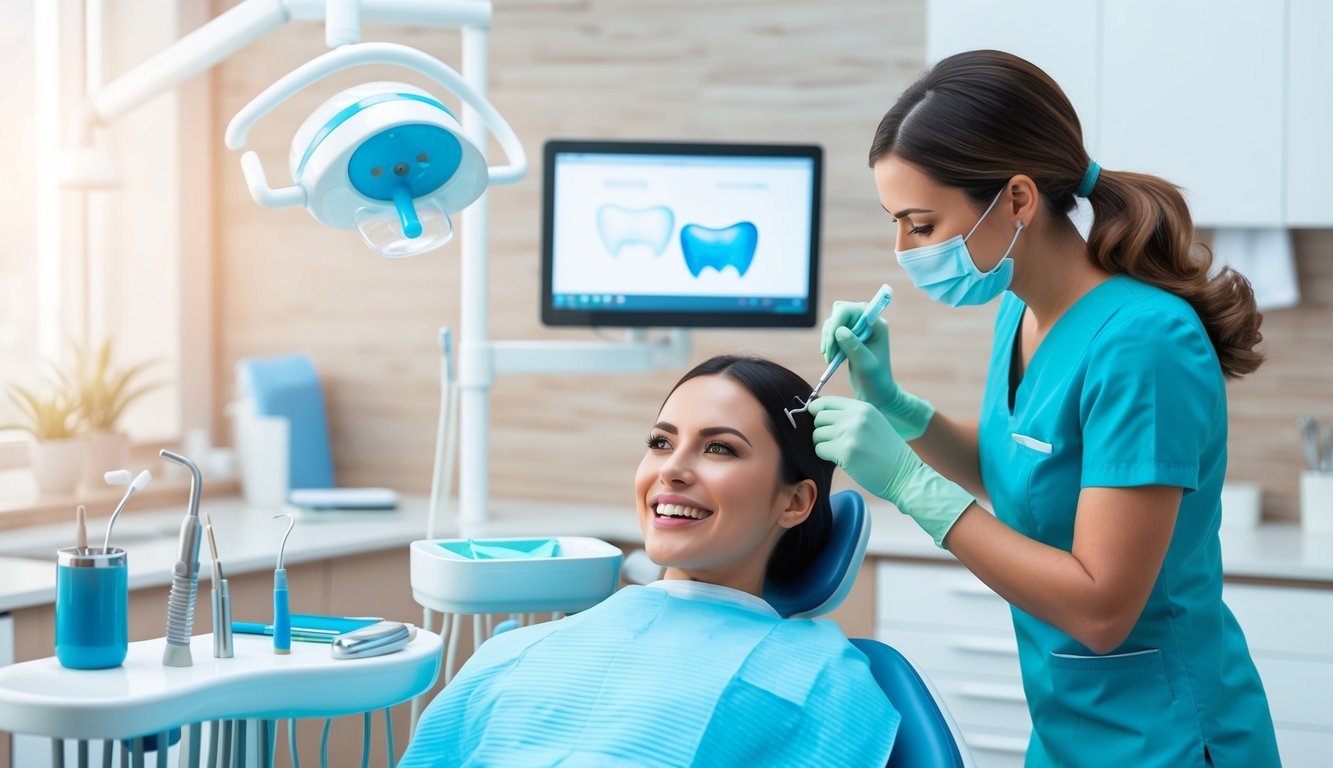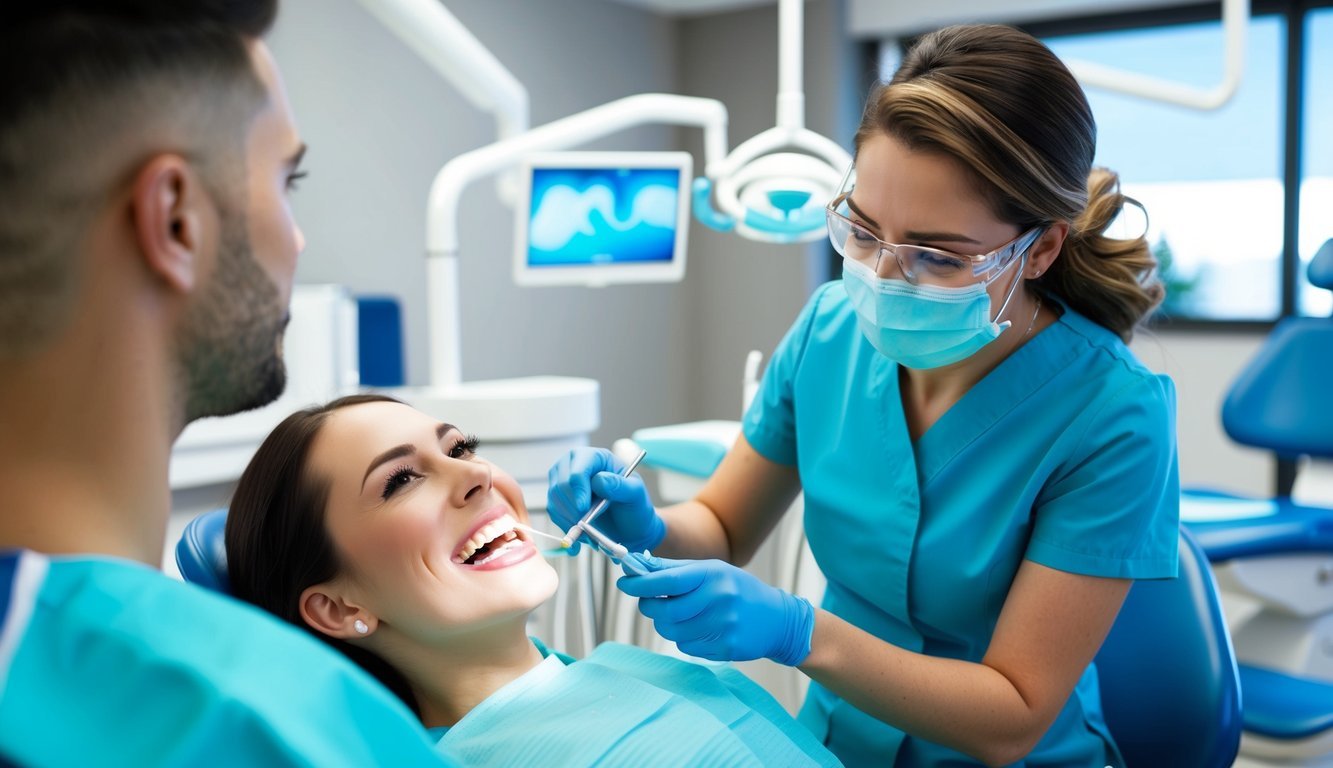Becoming a dental hygienist is a rewarding career choice that allows you to make a difference in people’s lives through oral health.
Typically, it takes between two and four years to complete the necessary education and training to become a licensed dental hygienist.
While pursuing this path, you will gain valuable skills and knowledge that will prepare you for a fulfilling role in the dental field.
As you progress through your education, you will learn about various techniques and treatments, as well as the importance of licensure and continuing education.
If you are curious about what the journey entails and the opportunities that lie ahead, read on to explore how to embark on this career.
Key Takeaways
- It takes two to four years to become a licensed dental hygienist.
- Ongoing education is essential for career growth in dental hygiene.
- The role involves crucial responsibilities that impact patient health.
Education and Accreditation
To become a dental hygienist, you need to follow specific education pathways and ensure your program meets accreditation standards.
Key aspects include the types of degrees available and the necessary program requirements for accreditation.
Undergraduate Degree Pathways
You can pursue different degree pathways to become a licensed dental hygienist.
The most common options are:
-
Associate Degree: This is the most typical route and usually takes about two years. Programs often include clinical practice and coursework in dental hygiene techniques.
-
Bachelor’s Degree: A four-year program that provides a deeper knowledge of dental hygiene as well as public health, research methods, and management. Many colleges and universities offer this option.
-
Master’s Degree: For those looking to advance their education, a master’s can lead to roles in education, research, or management. It typically takes an additional two years after a bachelor’s degree.
Consider programs from accredited colleges, community colleges, or technical colleges that inform you about future job opportunities and skill development.
Accredited Dental Hygiene Program Requirements
When choosing a dental hygiene program, ensure it is accredited by the Commission on Dental Accreditation (CODA).
This body sets standards for educational quality in dental hygiene.
Key requirements typically include:
-
Completion of Core Courses: These usually cover anatomy, periodontology, and radiography.
-
Clinical Experience: Most programs require hands-on training where you work with patients under supervision. This experience is essential for skill development.
-
National Board Exam: Once you graduate from an accredited program, you must pass the National Board Dental Hygiene Examination.
Research online dental hygiene programs as well, which may offer flexibility while still meeting accreditation requirements.
Be sure to check the specific requirements for your state since they can vary.
Licensure and Examination
To become a dental hygienist, you must complete specific licensure requirements and pass examinations.
These steps ensure that you have the necessary skills and knowledge to practice safely and effectively in your state.
National Board Dental Hygiene Examination (NBDHE)
The National Board Dental Hygiene Examination (NBDHE) is an essential step in obtaining your dental hygienist license.
This exam tests your knowledge of dental hygiene and related sciences.
It consists of two parts: the written exam and case studies.
The exam includes a total of 350 multiple-choice questions covering various subjects such as:
- Patient management
- Microbiology
- Nutrition
- Pharmacology
You need to pass this examination to apply for state licensure.
The results are valid for a limited time, so it’s crucial to be well-prepared when you take it.
For more details about the exam, visit the National Board Dental Hygiene Examination.
Clinical Board Examination and State Licensure
After passing the NBDHE, you must complete a clinical board examination.
This exam tests your hands-on skills in real or simulated environments.
Each state has different requirements and may require specific clinical exams.
State licensure is crucial to practice as a dental hygienist.
You must apply through your state’s dental board to obtain your license.
Each state has its own rules, so check with the local licensing authority for any additional exams or requirements.
The key steps include:
- Pass the NBDHE
- Complete a clinical examination
- Apply for state licensure
It’s essential to stay informed about changes in state requirements.
You can find more information regarding state licensure on the American Dental Hygienists Association.
Skills and Responsibilities

As a dental hygienist, you will need a combination of clinical skills and the ability to educate patients about their oral health.
Your responsibilities include performing various procedures and ensuring patients understand the importance of good oral hygiene.
Clinical Skills and Patient Care
In this role, you will perform dental cleanings, which involve removing plaque and tartar to help prevent gum disease.
You will use instruments such as scalers and ultrasonic devices to perform these cleanings safely and effectively.
Your clinical skills will also include taking X-rays to assist in diagnosing dental issues.
Proper technique in capturing images is critical to provide valuable information to the dentist.
Moreover, you will need strong interpersonal skills and communication skills to help patients feel comfortable.
Explaining procedures clearly and addressing patients’ concerns will enhance their experience and trust.
Preventive Services and Oral Hygiene Education
You will play a key role in promoting preventive services for oral health.
This includes applying fluoride treatments and sealants to protect teeth from decay.
Regularly assessing patients’ oral hygiene routines is vital.
Equally important is patient education.
You will teach patients about proper brushing and flossing techniques to maintain their oral hygiene.
Providing information about the risks of gum disease and other conditions can empower patients to take charge of their health.
By utilizing critical thinking, you’ll be able to tailor your advice to meet the unique needs of each patient.
This personalized approach can improve compliance and result in better outcomes for their oral health.
Career Outlook and Advancement

As a dental hygienist, you’ll find promising employment opportunities and avenues for career advancement.
The job outlook for dental hygienists is strong, driven by an increasing demand for dental care.
Employment Opportunities and Work Environment
Dental hygienists primarily work in dental offices, providing preventive care.
Your role often includes cleaning teeth, taking x-rays, and educating patients on oral health.
The work environment is generally positive and team-oriented, often collaborating with dentists and other dental professionals.
Employment Statistics:
- Job Outlook: Employment of dental hygienists is projected to grow by 9% from 2023 to 2033, which is faster than the average for all occupations.
- Salary: The median annual wage for dental hygienists was $87,530 in May 2023.
This growth reflects the ongoing emphasis on dental health and the importance of preventive care.
Career Advancement Pathways
There are several pathways for advancement in the dental hygiene field.
You can pursue specializations such as periodontics or pediatric dentistry, which may require additional training and certification.
Continuing Education:
- Many states require continuing education to maintain licensure. This allows you to stay updated on the latest practices and technologies.
- Earning a bachelor’s or master’s degree in dental hygiene can open doors to higher positions like dental hygiene educator or clinical specialist.
By pursuing these opportunities, you can enhance your skills and potentially increase your salary, leading to a fulfilling and lucrative career in dental hygiene.
For more details, you can read about the pathway to becoming a dental hygienist here.
Continued Professional Development

As a dental hygienist, continued professional development is crucial for enhancing your skills and maintaining licensure.
This section covers the importance of ongoing education and options for specialization within the field.
Continuing Education Requirements
To maintain your dental hygiene license, you must complete continuing education (CE) courses.
Most states require a certain number of CE hours every renewal period, typically ranging from 10 to 30 hours.
These courses cover various topics, including preventive care, dental technology, and patient management.
You can find accredited programs through organizations like the American Dental Hygienists’ Association.
Many courses are available online, making it easier to fit education into your busy schedule.
Regularly updating your knowledge helps you stay current with the latest practices and advancements in the dental field.
Specializing within the Dental Hygiene Field
You have several options for specialization as a dental hygienist, which can enhance your career prospects.
Some common areas include:
- Pediatric Dental Hygiene: Focusing on the dental care of children.
- Periodontal Therapy: Specializing in the treatment of gum diseases.
- Public Health: Working on community health initiatives.
Specializations often require additional education, such as certificate programs or additional degrees.
These qualifications can improve your job opportunities and allows you to offer advanced services.
Exploring these avenues helps you tailor your career path and can lead to greater job satisfaction.
For more information on specializations, check resources like the American Dental Hygienists’ Association.
Frequently Asked Questions

Becoming a dental hygienist involves specific education, financial commitments, and understanding potential challenges.
Below are answers to common questions you might have about the process and profession.
What is the required education to become a dental hygienist?
To become a dental hygienist, you need to earn an associate degree in dental hygiene, which typically takes two years.
Some choose to pursue a bachelor’s degree, extending education to four years.
Courses include subjects like chemistry, biology, and oral health.
What is the average salary for a dental hygienist?
The average salary for a dental hygienist varies by location and experience.
In the United States, the median annual wage is about $77,000.
This can change based on factors such as demand and additional certifications.
How long does it typically take to become a dental hygienist after graduating from high school?
After high school, becoming a dental hygienist typically takes two to four years.
This time includes completing your degree and passing necessary licensing exams.
Many programs also require clinical practice.
What are the estimated costs associated with dental hygienist education and certification?
Education costs vary by institution.
Community colleges may charge around $5,000 to $15,000 for a dental hygiene program.
Public universities can range from $20,000 to $50,000.
Additional costs may include textbooks, supplies, and exam fees.
What is the quickest path to becoming a dental hygienist?
The quickest path usually involves enrolling in an associate degree program and completing it without delays.
Some programs may offer accelerated courses, allowing you to finish in about 18 months.
Staying focused and meeting program requirements promptly can help.
Are there significant challenges faced when pursuing a career as a dental hygienist?
Challenges include the need for strong science skills.
You also need to manage clinical and academic workloads.
And you have to meet continuing education requirements for license renewal.
Keeping up with advancements in dental hygiene practices can also be demanding.

